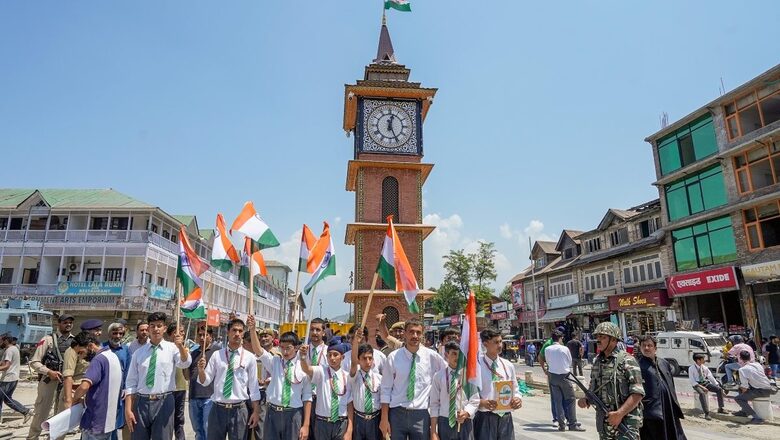
views
“Let us have faith that right makes might and, in that faith, let us; to the end, dare to do our duty as we understand it” — Abraham Lincoln
The fact is that ever since the decision was made to revoke Article 370 in August 2019, Prime Minister Narendra Modi’s government along with LG Manoj Sinha-led administration has acted in the best interests of ordinary Kashmiris. What’s unsettling is how the Western media has blatantly turned into a spokesperson for Pakistan, its intelligence services, and terrorists. Kashmir’s plight has been exploited for years and has been turned into a lucrative business for Pakistan’s establishment and some multigenerational families living abroad.
An important section of the local mainstream media of the valley played a detrimental role, acting as conduits for Pakistan and their paid proxies in Kashmir, particularly during the peak unrest years of 2008, 2010, 2016, and 2017. They willingly amplified destructive narratives on their front pages, from labelling terrorists as “rebels” and “fidayeen” to branding them as “armed separatists”.
This was part of an editorial warfare against India, with local editors, owners, and so-called journalists directly on Pakistan’s payroll. They profited handsomely while building narratives in favour of terrorists and secessionists, amassing significant wealth and assets for themselves in the process. Their actions have had severe consequences for the region.
Pakistan and the West are frustrated because they never expected India to thrive and host the G20 summit. While failed states and war-torn nations receive little attention, Kashmir continues to dominate Western headlines. Media giants like the BBC, NYT, and The Washington Post generously pay Indian-origin writers and journalists to peddle false narratives of hate, fear, riots, and so-called “intolerant democracy,” all in a bid to push their agenda of Hindutva and fascism. It’s time to see through this agenda-driven reporting and recognise India’s progress in Kashmir.
The BBC’s recent article, ‘Any story could be your last – India’s crackdown on Kashmir press’ by Yogita Limaye, on India’s supposed crackdown on the Kashmiri press is a one-sided, superficial piece of journalism. It conveniently omits crucial facts.
In the facade of journalism
The four journalists mentioned are not professionals but are intellectual overground workers (OGWs) for Pakistan’s ISI and terrorist-secessionist networks. As the report also fails to mention the criminal offences committed by these intellectual OGWs, it is about time that we set the record straight.
Fahad Shah
Fahad Shah, the editor-in-chief of the Kashmir Walla website, is at the epicentre of a storm of legal trouble. FIR No. 01/2022 filed by the State Investigation Agency (SIA) Kashmir under Sections 13 and 18 of the UAPA Act, along with IPC Sections 121, 153 B, and FCRA Sections 35 and 39, puts him in the hot seat. He has been charged with publishing an article that blatantly stoked the flames of terrorism, enticing young Kashmiris to take up arms.
But that is not all. Shah’s Kashmir Walla operated on a subscription-based model, and here’s where it gets murky. Pakistan’s ISI and its global network funnelled funds through this platform, fuelling unrest and pushing its propaganda in the region. What is shocking is that Fahad Shah managed not one but three bank accounts, raking in about Rs 95.59 lakh, including a hefty Rs 40 lakh in foreign contributions, all in brazen violation of the FCRA.
In one account alone, a staggering Rs 10.59 lakh flowed in from Paris-based Reporters Sans Frontiers (RSF) during 2020-21. It does not end there, as the money was slyly transferred in multiple instalments, despite the account lacking the FCRA registration it needed to accept foreign contributions. Another account received Rs 58 lakh, of which a suspicious Rs 30 lakh constituted foreign contributions via subscription payments.
As if this weren’t enough, Fahad Shah is also under investigation by the Kashmir Zone Police, with three more FIRs haunting his steps across different police stations in the valley for peddling terrorist-secessionist agenda and publishing stories targeting security forces personnel.
Asif Sultan
Another person whose name has surfaced in the article is Asif Sultan, who is facing charges under FIR No. 173/2018, including Sections 302, 307 RPC, 7/27 A Act, and 16, 17, 18, 19, and 20 ULA (P) Act. The charges are for glorifying Hizbul Mujahideen terrorist Burhan Wani in the Kashmir Narrator magazine and his ties to Ansar-Ghazwat-ul-Hind terrorists. He’s also accused of harbouring and sheltering two terrorists on August 12, 2018, who killed SgCt Parvaiz Ahmad during a police shootout and escaped.
Sajjad Gul
Likewise, Sajjad Gul, an independent journalist, is entangled in multiple cases, with FIR No. 12/2021, FIR No. 79/2021, and FIR No. 02/2022 under various Sections, including IPC 120-B and 153-B. He was even detained under the Public Safety Act and lodged in a UP jail for threatening a government officer, Tehsildar, by invoking his close relative’s alleged terrorist ties in Pakistan. By engaging in such actions, he has not only jeopardised regional security but has also destabilised the region.
Irfan Mehraj
Irfan Mehraj is another journalist with ties to global anti-India media outlets like Aljazeera and local newspapers like Kashmir Reader, who stand accused of receiving substantial sums from Pakistan’s ISI and employing terrorists for intimidation. Arrested by the NIA in FIR No. RC-37/2020, this former researcher at the Jammu Kashmir Coalition of Civil Society (JKCCS) is no stranger to controversy.
During his tenure, Irfan propagated fabricated tales of human rights violations in Kashmir while allegedly siphoning funds meant for victims from foreign human rights groups and visiting international delegations. He had been facilitating a dangerous agenda that threatened peace and stability in the region.
Western media spinning narratives
Quite conveniently, while the journalist found time to visit the family of an intellectual overground worker like Asif Sultan and shed light on the plight of his daughter Areeba, there was a glaring omission in the coverage. The journalist failed to make any effort to visit the families and daughters of countless martyred security force personnel, like Zohra, the daughter of martyred ASI Abdul Rasheed, who fell victim to terrorists in 2017.
The journalist missed an opportunity to witness and expose the havoc wreaked by Pakistani-sponsored terrorists and their narrative spinners on the young generations of Kashmir.
Some countries around the world are marred by instability, failed governance, and brutal civil conflicts. Yet, these dire situations often receive minimal attention from Western media when compared to the constant spotlight on Kashmir. This glaring disparity is exemplified by the actions of prominent global news outlets such as the BBC, The NYT, and The Washington Post.
These media giants are investing significant sums in Indian-origin writers and journalists, tasking them with the superficial task of perpetuating false narratives. They emphasise issues like hate, fear, riots, so-called intolerant democracy, press crackdowns, Hindutva, fascism, and more. Such narratives serve to distort reality and perpetuate a skewed image of India.
Furthermore, Western media inadvertently provide ideological cover to Pakistani-backed individuals and groups operating in the Kashmir Valley. These individuals, often referred to as Over Ground Workers (OGWs), have been instrumental in spreading subversion and terrorism in the region. As a result, it is the ordinary Kashmiri populace that has borne the brunt of their actions, enduring years of misery.
The modus operandi employed by these communal jihadis and intellectual OGWs involves manipulating the minds of impressionable youth. They systematically pushed these young individuals to engage in acts of violence against law enforcement and security personnel, primarily through stone-pelting. This forced the authorities to resort to punitive measures, sometimes including firing, creating the appearance of human rights violations. These orchestrated incidents then served as fuel for the propaganda machinery of these intellectual OGWs.
These individuals engaged in brutal deception, often manipulating the thoughts of minds that have been warped by manufactured feelings of victimhood, further exacerbating the situation. Through intentional falsifications, they cultivated a culture of radicalism, extremism, and hostility. Their psychological conditioning particularly targeted vulnerable youth, many of whom hailed from impoverished backgrounds. These young individuals were coerced into risking their lives in the name of so-called secessionism and terrorism.
While the Western media has extensively covered the Kashmir issue, scant attention is paid to the grave violations perpetrated by Pakistan against the Baloch people. Additionally, the severe restrictions on press freedom in Pakistan often go unmentioned. This lopsided focus perpetuates an incomplete and biased narrative, obscuring the larger picture of regional conflicts and human rights abuse.
While civil wars and terrorist insurgencies ravage many countries, the Western media fixates on Kashmir, maliciously attempting to smear the government as fascist with baseless lies. However, this is not the first time media giants like the BBC have pulled something like that, as they have been relentlessly pushing biased and false narratives about freedom and tolerance in India to smear the current ruling regime’s name and goodwill.
Emaad Makhdoomi is a Srinagar-based journalist and columnist. His Twitter Handle is @MakhdoomiEmaad. Views expressed in the above piece are personal and solely that of the author. They do not necessarily reflect News18’s views.



















Comments
0 comment